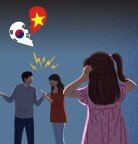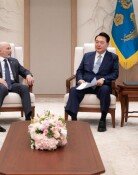Ruling party wastes time while those in need are waiting for relief fund
Ruling party wastes time while those in need are waiting for relief fund
Posted February. 15, 2021 07:36,
Updated February. 15, 2021 07:36
South Korean presidential office Cheong Wa Dae, the ruling Democratic Party of Korea and administrative leaders on Sunday outlined a plan on the 4th round of a disaster relief fund by deciding to give priority to industries and groups hardest-hit by the COVID-19 pandemic, including self-employed businesses and mom-and-pop stores. Democratic Party Chairman Lee Nak-yeon, who proposed to provide relief funds to every South Korean citizen, remarked that he will request the government to make sure that customized grants reach out to a wider group of recipients in a deeper depth. Thus, the fourth relief fund program will provide tailored assistance to a selective group with a larger sum of grants than 7.8 trillion won and 9.3 trillion won of the second and third rounds, respectively.
Since early February, there has been a heated debate on the fourth relief grant with ruling party leaders at odds with one another. After Chairman Lee mentioned the idea of giving out funds to its all citizens along with a customized approach, Finance Minister Hong Nam-ki criticized that national finance has its limitations. South Korean President Moon Jae-in has seemed negligent about the issue by using a vague expression “to an extent that the government can handle it fiscally” although he is supposed to get things right amid confusion between the government and the ruling party. After two weeks’ confusion, they managed to decide tentatively to give relief aid selectively to particular groups. However, those in need of cash such as the self-employed have suffered a time loss.
"We will discuss later whether to provide a relief fund for the sake of the revival of the domestic market,” said ruling party floor leader Kim Tae-nyeon. His message seemingly intends to say that the ruling party is still discussing the universal provision of relief funds and its discussion will go on after they watch how the pandemic is managed for a while. However, a great deal of caution and care should be paid before any decision is made to give out disaster funds to every citizen given that the volume of national debt is almost 1,000 trillion won. As economic research institutes such as the Korea Development Institute have analyzed that selective funds are more effective and efficient than universal grants, it is not sure that too generous grants will boost the domestic market.
The government and the ruling party plan to put in place a customized relief aid program late March at the latest. If they do not want to cause public suspicion that they take advantage of the relief program to win over the hearts of voters before the Seoul and Busan mayoral elections on April 7, they are not supposed to consider the election campaign schedule at all but to make it happen as soon as possible after fine-tuning the range of recipients and grants.







